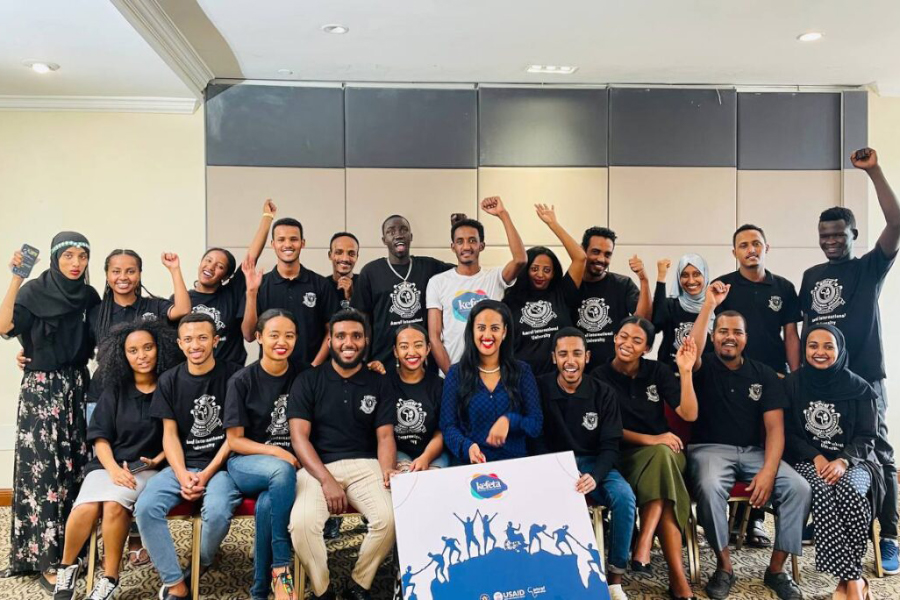
Fortune News | Jul 30,2022
Dec 14 , 2024
By Birhanu Beshah
With the fintech revolution, consumers and banks are caught between embracing new technology and suffering from banking platform fatigue. The risk may open up the field for integrated solutions. Amid these rapid shifts, resilience may be found in providers specialising in niche markets, while regulators may need to set up safeguards against anti-competitive practices, writes Birhanu Beshah (birhanu.beshah@aait.edu.et), an associate professor researching digital platforms, former CEO of the Ethiopian Railways Corporation and head of its engineering centre.
Historically, government policies and regulations have allowed commercial banks to prosper by operating across multiple platforms and maintaining broad customer bases. They have launched mobile apps, websites, and USSD services, enabling customers to manage accounts, transfer funds, and make various payments.
Fintech services are multiplying rapidly, each vying for a share of a market that could either continue to support multiple providers or collapse into a winner-takes-all scenario.
The Commercial Bank of Ethiopia’s CBE Mobile Banking, Dashen Bank’s Amole, and Bank of Abyssinia’s Apollo are typical examples. Digital wallets, such as M-Birr and E-Birr, were among the pioneers of innovation in this sphere, but the recent emergence of TeleBirr has changed the market dramatically, driving up wallet usage. It called into question whether incumbents’ once-assumed longevity still holds.
Banks have since introduced their wallets, illustrated by CBE Birr, while the arrival of Safaricom’s M-Pesa, an established market force in the East African Community, further indicates that foreign entrants may struggle to break into an increasingly contested field.
Payment gateways follow a similar path, designed to integrate financial institutions and merchants for seamless transactions.
EthSwitch, formed by a consortium of commercial banks, was incorporated as a national gateway integrating ATMs. Other entrants, including Chapa, ArifPay, and Santimpay, have now joined it. Beyond these gateways, AI-powered services are emerging in the lending market for micro, small, and medium-sized enterprises, represented by the Oromia Cooperative Bank’s Michu and Wegagen Bank’s Efoyta, with several more under development.
The flurry of activities has drawn the attention of policymakers, state-owned enterprises, domestic and foreign banks, investors, startups, and members of the public. The allure of fintech’s promise is evident, but whether it will yield widespread and lasting success remains a matter of debate.
A clearer understanding requires recognising that fintech business models often fall into two categories.
There are those built on the expectation that customers will use multiple services, mirroring traditional banking’s multi-homing approach. Then, there is the possibility that digital platforms will instead tend towards a winner-takes-all outcome, leaving only a few dominant players in control.
TeleBirr’s swift rise, partly credited to favourable policies, hints at the potential for these power imbalances to occur. Even M-Pesa, long established elsewhere, has found gaining traction in the face of such entrenched advantages difficult. Customers, too, may become weary of juggling multiple banking apps, digital wallets, and payment gateways. They might prefer an integrated solution, and AI-driven services could struggle if relevant information remains fragmented across various channels.
The final shape of the domestic fintech market is yet to be determined, and the truth may lie somewhere between the extremes of broad-based multi-homing and a sudden consolidation. Operators and regulators have reasons to anticipate potential pitfalls and consider measures that might address the impact of rapid shifts.
For operators, building resilience through specialisation and focusing on niche markets could help them survive market turbulence. For regulators, implementing guardrails against anti-competitive practices may protect consumer interests and promote a healthier and more diverse financial ecosystem.
As the fintech sector evolves, these precautions may prove vital, ensuring that technological progress translates into genuine choice and stability for consumers and businesses alike.
PUBLISHED ON
Dec 14,2024 [ VOL
25 , NO
1285]


Fortune News | Jul 30,2022

Fortune News | Nov 06,2021

Radar | Apr 03,2023

Fortune News | Jan 05,2019

Fortune News | May 02,2020

Fortune News | Feb 17,2024

Radar | Jun 11,2022

Viewpoints | Apr 26,2025

Radar | Sep 29,2024

Radar | Nov 02,2025

Photo Gallery | 180703 Views | May 06,2019

Photo Gallery | 170897 Views | Apr 26,2019

Photo Gallery | 161987 Views | Oct 06,2021

My Opinion | 137305 Views | Aug 14,2021

Dec 22 , 2024 . By TIZITA SHEWAFERAW
Charged with transforming colossal state-owned enterprises into modern and competitiv...

Aug 18 , 2024 . By AKSAH ITALO
Although predictable Yonas Zerihun's job in the ride-hailing service is not immune to...

Jul 28 , 2024 . By TIZITA SHEWAFERAW
Unhabitual, perhaps too many, Samuel Gebreyohannes, 38, used to occasionally enjoy a couple of beers at breakfast. However, he recently swit...

Jul 13 , 2024 . By AKSAH ITALO
Investors who rely on tractors, trucks, and field vehicles for commuting, transporting commodities, and f...

Nov 1 , 2025
The National Bank of Ethiopia (NBE) issued a statement two weeks ago that appeared to...

Oct 25 , 2025
The regulatory machinery is on overdrive. In only two years, no fewer than 35 new pro...

Oct 18 , 2025
The political establishment, notably the ruling party and its top brass, has become p...

Oct 11 , 2025
Ladislas Farago, a roving Associated Press (AP) correspondent, arrived in Ethiopia in...

Nov 2 , 2025
The National Bank of Ethiopia (NBE) has scrapped the credit-growth ceiling that had s...

Nov 2 , 2025 . By SURAFEL MULUGETA
The burgeoning data mining industry is struggling with mounting concerns following th...

Nov 2 , 2025 . By YITBAREK GETACHEW
Berhan Bank has chosen a different route in its pursuit of a new headquarters, opting for a transitional building instea...

Nov 2 , 2025 . By BEZAWIT HULUAGER
Nib International Bank S.C. has found itself at the epicentre of a severe governance...